Alex Garland has set an incredibly high bar for himself. From his directorial debut, Ex-Machina, to the highly-anticipated sophomore feature, Annihilation, to his recent turn on television with the sci-fi thriller Devs, his work in the genre realm has made an impact. This impact was once again felt when the title of his latest film, Men, was revealed.
Carrying a certain weight, the title alone highlights the risk taken with the project. Some of that risk doesn’t quite pay off. The film features powerful performances from Jessie Buckley and Rory Kinnear, incredible body horror elements, and gorgeous cinematography. Unfortunately, while Men starts off strong, the abstract nature of its third act may alienate and confuse depending on the viewer. The third act is what will make or break the film for people.

Men follows recently widowed Harper (Buckley), who has booked a countryside home to start anew after the death of her husband. Hoping to get some peace, she gets anything but. Someone (Kinnear) is following her. It starts in the woods, but it’s not long before the metaphorical noose of dread starts to tighten itself around her. With things rapidly escalating, she must either face her fears or succumb to the nightmares that have followed her.
Garland has been open about how Men is designed to allow the viewer to project what happens onscreen. It’s an ambitious and risky undertaking. For this approach to work, there needs to be a balance of sorts. A relationship needs to be built with the viewer. Dialogue should be natural here, down to the most trivial detail. This creates a subtle grounding needed to get under the skin. In the case of Men, it also becomes essential in creating that suspension of disbelief required for later elements. Especially if the tonal transition from the second to the final act is shaky in execution.
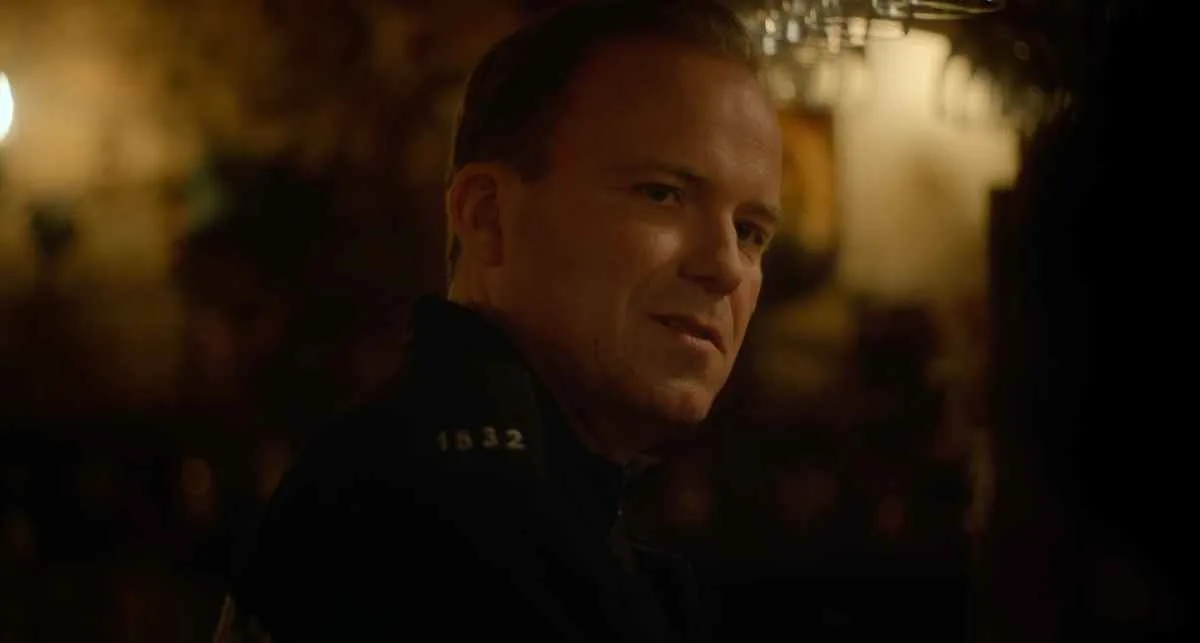
For the most part, Garland succeeds there, and this is where the collaboration between himself and the actors pays off. The conversations between Jessie Buckley’s Harper and Rory Kinnear’s multiple avatars will feel familiar. There are enough subtleties in the words exchanged to raise blood pressure, especially in key emotionally vulnerable scenes.
These conversations highlighted onscreen are also a gateway into the weighty thematic material Garland is sifting through. Whether dissecting masculinity and its various guises, the often uneven gender dynamics between men and women, and more, there are breadcrumbs sprinkled about for thoughtful consumption.

What helps here is well is how game all the actors are. Buckley’s Harper is in every scene of the film, and she captivates. Presenting as Garland’s interpretation of a final girl figure, much like any other final girl, her experiences shape her and push her to the next stage.
And, as the main character for us to project ourselves onto, we are easily taken on the journey with Harper in figuring out what the heck is going on in part due to Buckley’s performance. While it’s no surprise, Men is another example of Buckley’s range and her willingness to push herself to emotional and vulnerable extremes.

It may not be raining men, but Rory Kinnear tries to be all of them in Men. Losing count after the fourth character, Kinnear is unsettling. He’s also a madman. Maybe a wee bit masochistic considering how he’s set himself up to taking on this devil’s task of a gig. But he succeeds. There’s an understatedness to how he has made each character feel distinct yet familiar.
There are subtle changes in the body movements and muscle twitches; the costumes, wigs, and makeup also aid in setting each character apart. But the throughline that Kinnear maintains, which is essential for an undertaking such as this, is the deep underlying menace and danger directed towards Harper. Especially as things escalate with each rejection and slight.

Paapa Essiedu’s James may get lost in the discussion, but he needs to be mentioned. As the catalyst for how Harper even ends up at this countryside home, his presence is felt everywhere. While viewers only get to see James in flashbacks, what moments we get have a major impact and — again — highlight things Garland hopes to spark conversations about.
Intimate partner violence — both mental and physical — is featured here, so this is my trigger warning to those who need it. Essiedu, in this moment, manages to terrify but also facilitates a feeling of pity. You can’t help but pity the character who would utilize the methods he does in Men. Others might feel differently, but that is what Essiedu’s performance with Buckley brought out in me.
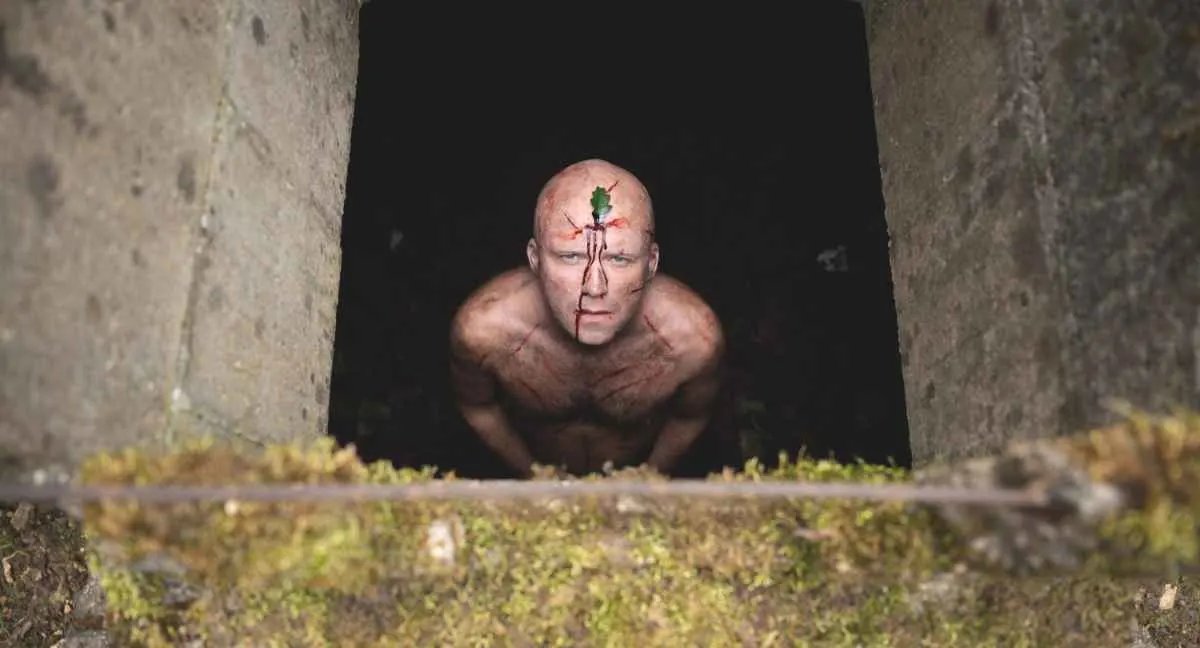
Where things take a left turn is the third act, and part of it may stem from confusion surrounding the Green Man and the symbolic nature of the character. Symbolizing rebirth as well as representing primal masculinity, this knowledge ahead of time is helpful once the third act begins. That said, without familiarity with the Green Man, there might be confusion for the viewer as there is not much in terms of explanation as to who or what he is in the film.
The edit of the film’s third act is also jarring, which, coupled with the previous paragraph, aims for disorientation. But it also comes across as unintentionally awkward and/or funny, depending on the individual. One sound edit, in particular, ended up undercutting the seriousness of a scene that transpired. Instead, it elicited some laughter in the audience. Whether intentional or not, it created a tone that didn’t mesh and ended up being the moment where the required suspension of disbelief was severed.

After this point, it was difficult for Men to find its footing again. Given the further escalation that follows the scene in question, it ended up weakening the overall impact that the final act could have had. This does not take into account how abrupt the ending feels as well. The ending itself could have been drawn out just a little bit without feeling like we had just hit a doorstop.
It is in this third act that we get to see some incredible horror moments. So, for those who just weren’t feeling like Men was horrifying enough, it is in this act that Garland digs deep into the genre. This is further amplified by Jake Roberts’ editing, with quick cuts further amplifying the escalating tension between Buckley’s Harper and Kinnear’s many doppelgangers.
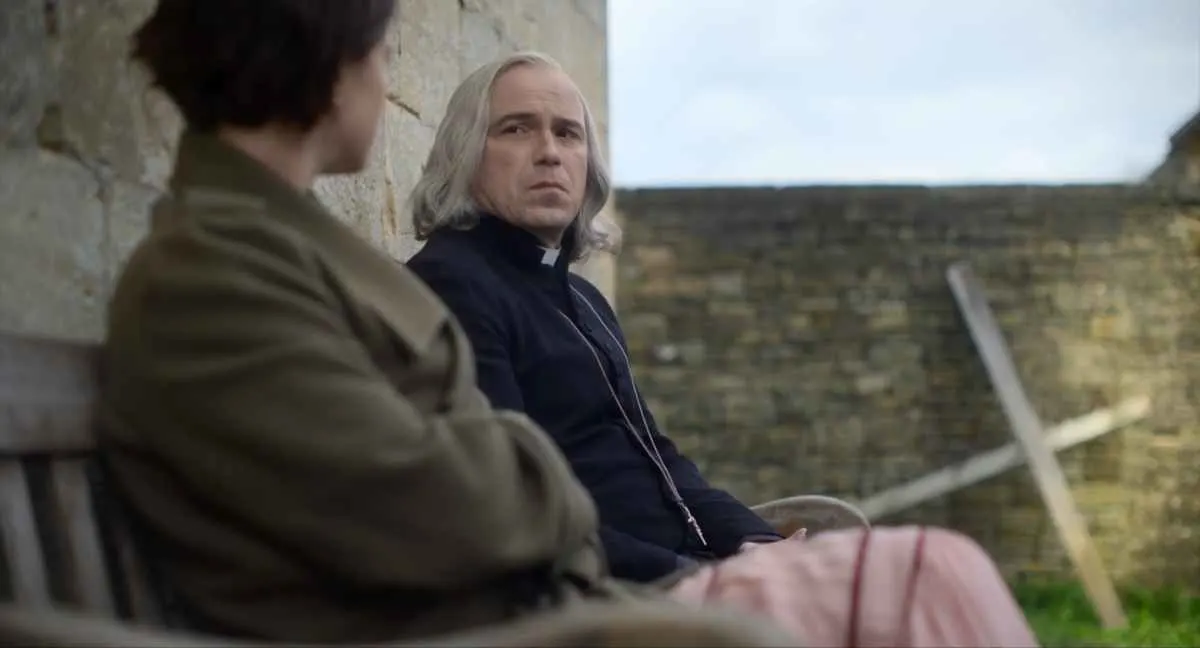
This is also where we get some serious body horror action, with Kinnear going all in with his physicality. Without giving anything away, these particular moments are easily the most memorable visually in Men. It’ll sear your brain.
Visually, Men is gorgeous. But this is no surprise. Garland brought back cinematographer Rob Hardy. His lens takes in every inch of the countryside, connecting us again to the inherent primal undercurrent in the story. The dandelion blowing in the wind and the ominous darkness of the tunnel are memorable snapshots that are striking in their simplicity.
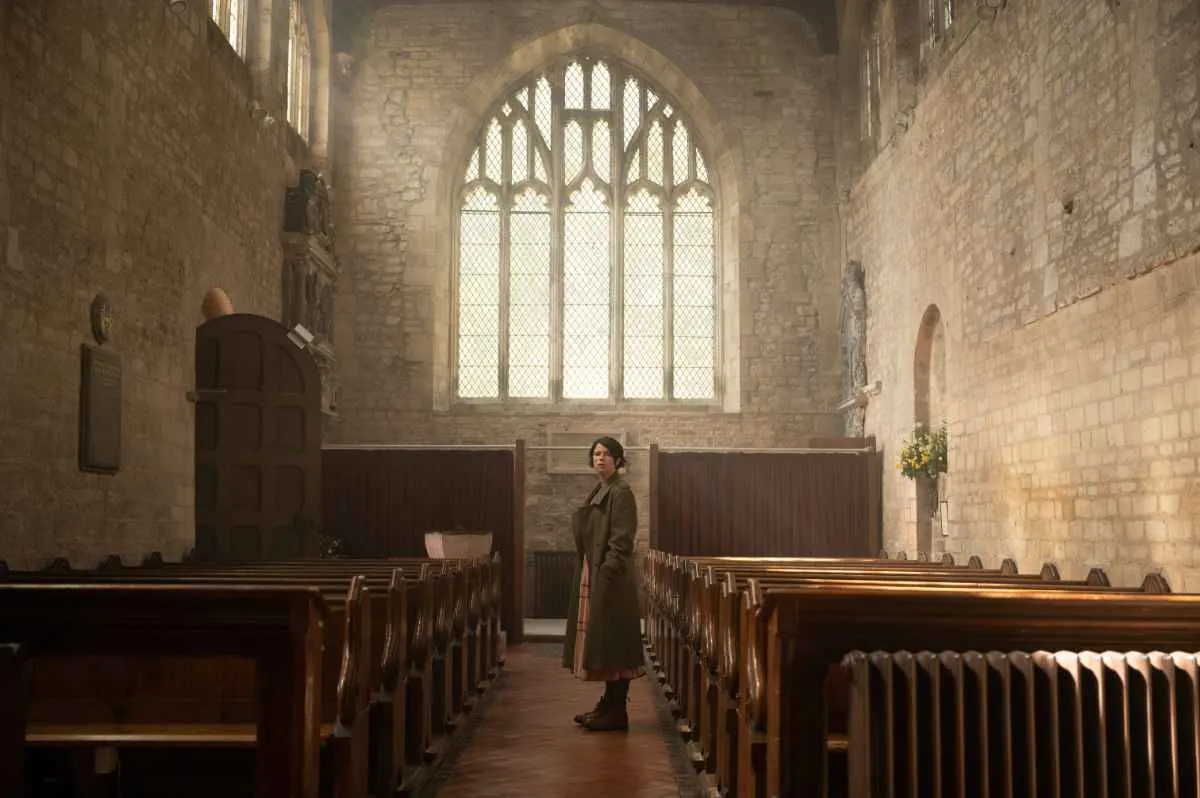
The only time where the visuals didn’t quite mesh was when Kinnear has to embody being a young boy. The VFX work utilized to de-age Kinnear’s face transplanted onto the young boy’s body isn’t executed smoothly here. Given the technological difficulties involved, though, in executing such a task, there is some wiggle room for forgiveness. As technology continues to evolve, this type of effect will be easier to achieve.
As is the case with his work, Alex Garland‘s Men will leave much to think about as the credits roll. This time around, though, it will be polarizing. Not just due to its title but also due to how the story plays out onscreen.

Gender dynamics are a huge part of the story, and given the emphasis by Garland on creating something designed for individual projection, key moments can be interpreted in a multitude of ways. That said, the strong performances from the cast work well in keeping the viewer glued. The subtleties conveyed, in particular, by Jessie Buckley and Rory Kinnear help keep things grounded but also have a way of making us invest in Harper’s plight onscreen.
While heavily influenced by symbolism and weighty thematic material, the more abstract nature of the third act, coupled with interesting editing decisions and the abrupt feel of its ending, ends up shrinking the success that could have been. Such is the nature of experimenting and taking risks in storytelling.
MEN REVIEW SCORE: 6 OUT OF 10
A24 will release the film in theaters on May 20, 2022. The movie is rated R for disturbing and violent content, graphic nudity, grisly images, and language.
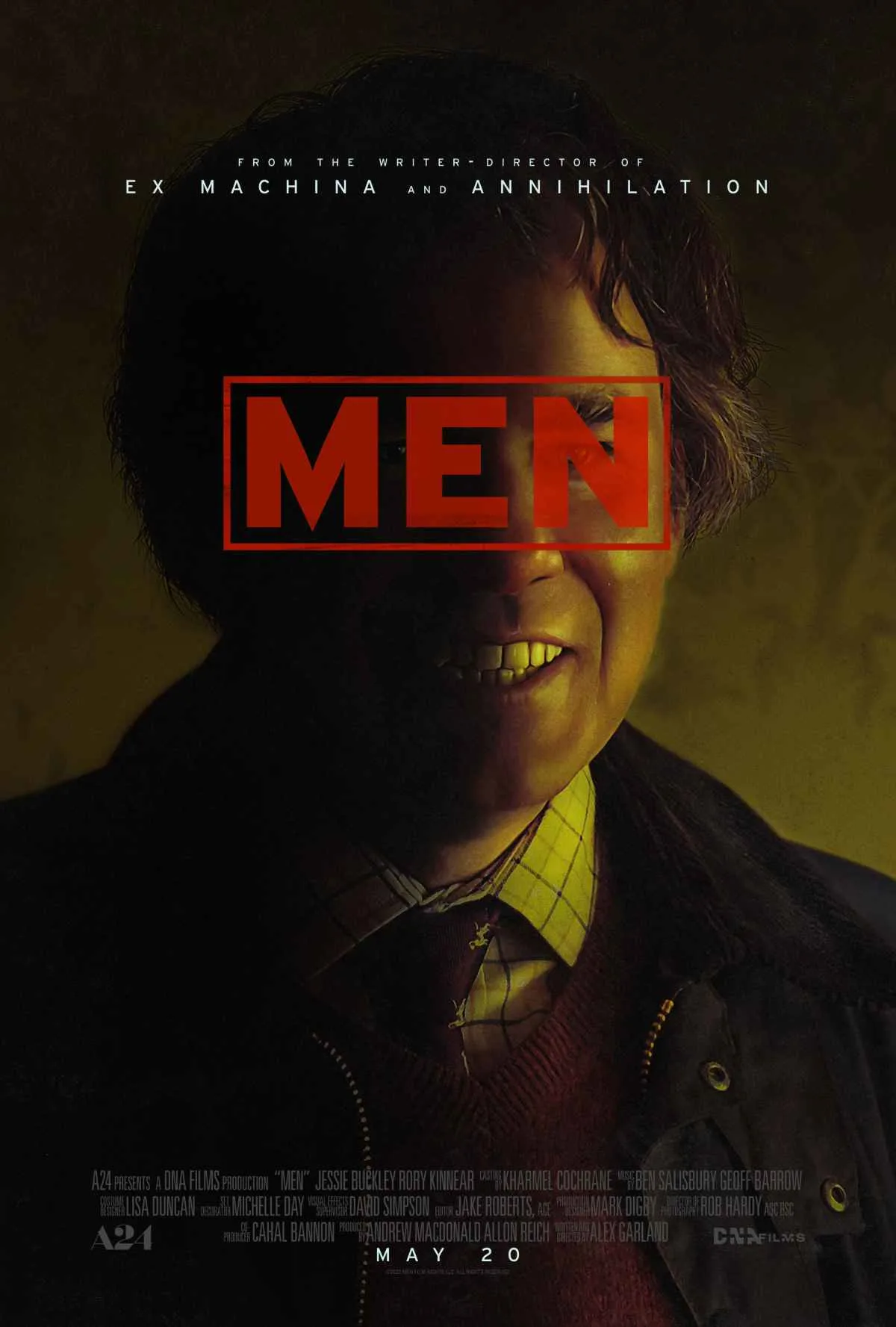

Sarah Musnicky is a freelance writer and self-described workaholic. She loves fantasy and sci-fi and will admit to having dual loyalties between Star Trek and Star Wars as well as Marvel and DC. When she’s not being socially awkward, she is in a corner obsessing over dragons, cute things, and a need to master all languages on the planet. She would like to be a professional blanket burrito when she reaches the peak of maturation.